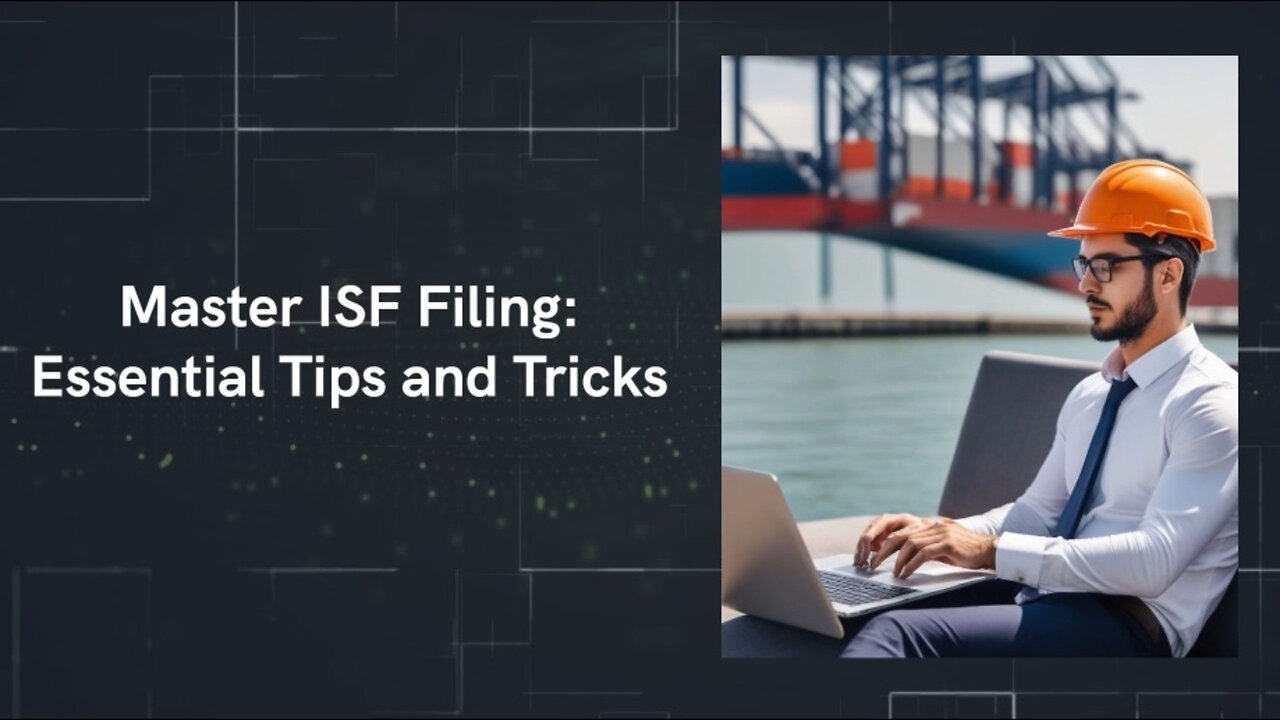Premium Only Content

Mastering ISF Filing: Insider Tips to Streamline Your Imports
ISF Filer || isf@isffiler.com || 858-280-9374 || www.isffiler.com
In this video, we explore the best practices for Importer Security Filing (ISF) filing, which is a mandatory requirement by the US Customs and Border Protection (CBP) for importers. Accurate and timely filing is important to fulfill legal obligations, avoid penalties, delays, and scrutiny. Gathering all necessary information in advance and ensuring its accuracy is crucial. Utilizing the services of a reliable customs broker can simplify the filing process. Implementing an effective internal workflow and staying informed about regulatory updates are additional best practices. By following these tips, importers can enhance their ISF filing process and minimize potential issues.
Response:
Hello and welcome to our channel where we delve into the world of customs brokerage, customs bonds, Importer Security Filing (ISF), and international trade. In today's video, we will be taking a deep dive into the best practices for Importer Security Filing (ISF) filing. ISF filing is a mandatory requirement by the US Customs and Border Protection (CBP) for importers to provide key information about their shipments before they arrive at a US port. Accurate and timely filing of the ISF is crucial to fulfill legal obligations, avoid penalties, delays, and extra scrutiny from the CBP. To achieve this, importers should gather all necessary information well in advance, ensuring details about the importer, consignee, purchasing party, manufacturer, seller, supplier, and more are readily available. Accuracy and up-to-date information are vital, and therefore double-checking before submitting the filing is essential. It is also advisable to keep a record of all filed ISFs for future reference. Utilizing the services of a reliable customs broker can greatly simplify the filing process, as they are experts in navigating the complexities of importing and can ensure compliance with all requirements and a smooth customs clearance process. Implementing an effective internal workflow is another important best practice, assigning dedicated personnel or a team responsible for gathering and reviewing all necessary information. Lastly, staying informed about regulatory updates and changes related to ISF filing is crucial, as customs regulations can change, and importers need to adapt to remain compliant and avoid penalties. By following these best practices, importers can streamline their ISF filing process, minimize delays and penalties, and ensure smoother trade transactions. Thank you for watching, and don't forget to like the video and subscribe to our channel for more informative content on customs brokerage and international trade.
#usimportbond #isfcustomsbroker #uscustomsclearing #isfentry
Video Disclaimer Here: This video is intended for educational purposes and has no affiliation with US government entities.
00:32 - Importer Security Filing (ISF), also known as 10+2 filing, is a mandatory requirement by U.S. Customs and Border Protection for importers to provide key information about their shipments before arriving at a U.S. port.
1:00 - Accurate and timely ISF filing is essential to fulfill legal obligations, avoid penalties, shipment delays, and scrutiny from CBP, while also streamlining the supply chain and enhancing operational efficiency.
1:23 - Best practices for ISF filing include gathering necessary information in advance, ensuring accuracy and up-to-date data, utilizing a reliable customs broker, establishing an effective internal workflow, and staying informed about regulatory updates.
3:09 - Following these tips can lead to a smoother and more efficient ISF filing process, minimizing delays, penalties, and potential issues, ultimately enhancing compliance and trade transactions efficiency.
-
 6:01:28
6:01:28
Amish Zaku
9 hours agoVerDanceKey Warzone - Birthday Fun
47.2K5 -
 5:15:22
5:15:22
NeoX5
6 hours agoKhazan: The Road Less Taken | Part 5-2 | Rumble Studio | Rumble Gaming
39.5K1 -
 LIVE
LIVE
TwinGatz
12 hours ago🔴LIVE - He Is Doing His Best | ARMA Reforger
759 watching -
 54:40
54:40
LFA TV
16 hours agoSee God in the Trade War | TRUMPET DAILY 4.7.25 7PM
65.1K15 -
 1:18:30
1:18:30
Sarah Westall
9 hours agoNew Study: EMFs Literally Put You into a Brainwave Cage; Reclaiming your Mind w/ Ian & Philipp
78.6K22 -
 35:54
35:54
SantaSurfing
10 hours ago4/7/2025 - Trump Tariff impacts - he wants no Capital Gains Tax! Inflation falls to 1.22%!
48K34 -
 59:17
59:17
We Like Shooting
20 hours ago $3.59 earnedDouble Tap 404 (Gun Podcast)
31.8K1 -
 10:06:28
10:06:28
ZWOGs
14 hours ago🔴LIVE IN 1440p! - GRAPHIC DESIGN, Schedule 1, TARKOV, GTAV RP!! | Dwindle Digby | - Come Hang Out!
27.2K -
 4:51:28
4:51:28
Meisters of Madness
10 hours agoThymeSia - Power of the Plague
21.4K -
 1:13:25
1:13:25
Kim Iversen
12 hours agoAmerica First? Then Why Are We Funding This? | Empathy Is the Left’s Weapon—Here’s Why It’s Dangerous
136K184